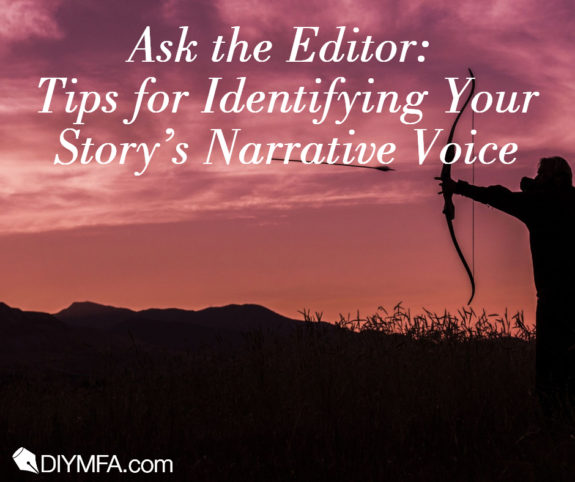Dear Editor,
Do you have any suggestions on how to write a story as if the MC is looking back at earlier events? For my story to work, I feel my narrator needs the accumulated knowledge and wisdom to be able to describe many of the things she encounters and make sense of them.
I don’t want to include a scene with her as an old woman telling her story, and I’m trying to avoid “If I had known…” and other similar cliches that drop readers out of the story.
I had hoped that the fact that I wrote it in past tense would imply the story has already happened but my beta readers disagree.
Is there a way to hint that something has already happened without killing the suspense?
Sincerely,
Stymied
Dear Stymied,
Narrative voice (Who is telling the story? When/where is the story being told? Why are they telling this story?) is probably the hardest element of writing to get “right”. As you’ve already discovered from your beta-readers, you can think you’ve gotten it just perfect, only to discover your readers were lost, confused or disconnected from the story. Each new story presents its own narrative challenges. I could probably write a whole series on voice to try to answer your question. For now let’s look at those three questions, to see if they reveal anything else about your particular narrative’s problem.
Who is telling the story?
The interesting thing about voice and point of view is that it can be invisible or it can be completely dominating. The goal is to figure out what you need the narrative to do for the reader. If you didn’t need narrative at all, your story would be comprised entirely of dialogue between characters. But have you ever tried to write that way? It gets confusing pretty quickly.
The narrator in any story has a very particular role: to help (or less commonly, to hinder) the reader make sense of the story. The character in the midst of the story doesn’t know what she doesn’t know yet the way that the reader does. That’s part of good foreshadowing, allowing the reader to catch a glimpse of and anticipate what is going to happen next.
Sometimes writing from the main character’s point of view as they experience the story makes more sense. Sometimes revealing too many details of the story’s world or other characters’ experiences in the story kills the tension. In that case, writing from your main character’s perspective is ideal. That way your reader learns important details of plot and other characters’ motivations at the same time as the main character, adding the element of suspense and emotional impact.
One thing to consider, as you work out what your readers need to know versus what your character knows: Is your main character (protagonist) really the narrator? Think of stories like The Book Thief; The Lion, The Witch, and The Wardrobe; Wuthering Heights; and even the Harry Potter series. We see the world and the action often through the eyes of the protagonists of each of these stories, but in each case we have a narrator who has a wider knowledge of the story and the world to help us (the reader) make sense of what the characters might not understand yet.
When is the story being told?
It might seem obvious, but the “when” of a story has very little to do with the verb tenses you use in constructing the lines of your narrative. Some writers use first person, present tense to convey urgency and being in the moment to the reader. But this isn’t always necessary. Can you imagine reading a battle scene from Lord of the Rings in first person present from Aragorn’s point of view? Whew!
Conventional storytelling leans heavily on third person past tense. Does this mean that the reader feels like the story is taking place in the past when they read it? Not always. The magic of storytelling is transporting your reader into the moment with your character. This happens in spite of the verb tense, often. Third person past tense, in this case, gives the reader just enough narrative distance from the plot to be able to process what’s happening, without losing the immediacy of the action. They’re still immersed in it, experiencing the story as it happens to the characters.
As you revise, consider: If your story is being told by a character looking back on events that happened in her past, and you want your reader to understand that, you may have to tell your reader that in as obvious a way as possible, especially if you want to avoid using cliche terms like “If I’d only known…” You could give the framework a structural element (like diary entries) or reveal everything about the narrator’s circumstances in the prologue, or something like that.
Recognize what this kind of information does to the reader’s experience of the narrative, though. I am pretty squeamish when it comes to reading (or especially watching) scary stories. But I was able to read and enjoy World War Z for one very important reason: The narratives were all obviously being told by characters who had survived. That element of suspense (will they make it or won’t they?) that often drives the reader’s connection to the character was, for better or worse, removed.
If your readers need particular information to understand a scene, but the character learns it only after they survive the scene, and you want to keep that element of suspense, you may need to consider this next question.
Why is the story being told by this particular voice?
This last question relates very closely to the first one. Omniscient narrators are best when they can be neutral, helping the reader connect details in the story to particular characters but not trying to influence the reader overly much. They don’t have any agenda or particular reason for giving you details other than to help you get a clearer picture of the story world and the characters.
When you tell a story from a particular character’s point of view (for a paragraph, for a chapter, or for the full length of the manuscript), it’s because you want the reader to experience the story through that character, because they have something important to tell us that none of the other characters in the story could share in quite the same way. Remember that each character has their own agenda and personality. That’s what makes their perspective so distinct from the other characters.
Orson Scott Card took this to the extreme in his Ender series. The book Ender’s Shadow has the same plot as the book Ender’s Game, but it’s told from the perspective of a secondary character. Because this character has such a different perspective from the main character of Ender’s Game, even though you know exactly “what will happen”, the story feels new.
What you need to consider as you tell your story is that your character who is the narrator and the character who is acting out the plot are not the same person. Sure they have the same name, but the story changes your character as she experiences it. So by the time she gets to the point where she’s ready to tell it to you, she’s a completely different person. And this story is obviously very personal for her. It’s her story! That adds another layer to the question: It’s not just why is she telling this story? It’s why is she telling this story? Is this character the only one who can tell this particular story and share the details the reader needs to know? Are those details a strong enough reason to sacrifice suspense?
The answers to these questions will help you decide who your narrator is.
How to “Ask the Editor”
Send your questions to ekauffman@writingrefinery.com. Limit yourself to a few paragraphs to introduce yourself and the problem at hand. “Brevity is the soul of wit,” after all. And keep an eye out for opportunities to send in longer submissions for critique.
 Elisabeth Kauffman is a freelance editor in California. Her favorite genres are YA fantasy, sci-fi, and romance. She regularly obsesses over board games, Doctor Who, and Harry Potter. Come share your ideas with her on Facebook and Twitter and on the web at www.writingrefinery.com. Also, check out her author website and her author page on Facebook.
Elisabeth Kauffman is a freelance editor in California. Her favorite genres are YA fantasy, sci-fi, and romance. She regularly obsesses over board games, Doctor Who, and Harry Potter. Come share your ideas with her on Facebook and Twitter and on the web at www.writingrefinery.com. Also, check out her author website and her author page on Facebook.







